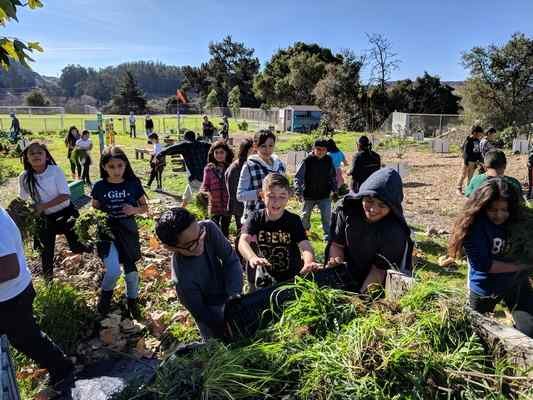Life Lab grows gardeners through ‘the power of garden-based learning’ - Santa Cruz Sentinel
Life Lab grows gardeners through ‘the power of garden-based learning’ – Santa Cruz Sentinel
Posted on at Santa Cruz Sentinel
June 14, 2018
By Calvin Men
View as PDF
When you ask John Fisher how he knows school gardens have an impact, he’s quick to pluck a memory from years ago.
Third graders were out in a garden and among them was a recent immigrant from Central America. The boy spoke only Spanish, needed a speech therapist for school and had yet to utter a word in class. Fisher saw the boy pause over a strawberry shrub and eye the fruit.
Fisher picked one, handed it to the boy and said “fresa,” Spanish for strawberry. The boy repeated the word to himself and ate the fruit, breaking his three-week long silence.
“That just speaks to the power of garden-based learning,” said Fisher, director of program and partnerships for Life Lab Science Program. “Being in an outdoor setting and outdoor classroom can open up kids in ways that we never expect.”
Life Labs are environments where students marry academics with practical knowledge in a school garden setting. The Life Lab Science Program based out of Santa Cruz is what perpetuates those environments with elementary school students.
“When you’re in a school garden, you really get to know that something rots and turns into soil. You know that food comes from a plant that takes air and sun and soil and water,” Fisher said.
Of the life labs that have taken root in Santa Cruz County schools, the nonprofit has had a hand in planting most of the seeds. So much so that the name Life Lab is usually synonymous with school garden. Life Lab’s origin began in 1979 with a garden at Green Acres Elementary. From there, it slowly grew into a nonprofit organization that spread and took root throughout the county.
School gardens have a deep history within the United States. The then-named U.S. Bureau of Education started the School Garden Army to encourage students to grow food locally during World War I with funding from the national War Department.
But the most recent movement on the federal level came from former First Lady Michelle Obama, who spearheaded the Let’s Move campaign for healthier children during her White House tenure. Part of that included encouraging school gardens, a sentiment that Life Lab capitalized on.
While the nonprofit has seen enthusiasm for school gardens ebb and flow for decades, they’ve also taken matters into their own hands. The program created a curriculum for garden-based learning and published it in 1982. It has since been updated three times.
In addition, the nonprofit offers on-site training to teachers and gives a discount to Santa Cruz County teachers. Don Burgett serves as executive director for the nonprofit and said the organization is aiming to get half of the county schools set up with a thriving garden program.
“Sometimes if a champion moves along … the garden will revert to disuse,” Burgett said. “So we’ve been trying to check back with folks.”
One of those includes a program the nonprofit started in the Watsonville-area. Leaders are starting to see growth in the seeds they planted in South County in 2014. The nonprofit reached out to Pajaro Valley Unified School District after realizing they needed to make more of an impact.
“Up until three years ago, there was just a handful of school garden programs in after school programs in PVUSD,” Fisher said. “It was only three or four schools and there are 16 elementary schools. So we kind of looked at our county and said, ‘Who’s underserved now?'”
Since they began, they won a three-year grant that expanded the program from two schools to five. But it takes more than setting the program up. Fisher and Burgett say they don’t want to fall into the trap of creating a program in times where funding is available and letting it fall into disarray when funding is unavailable.
“We’re really headed into a deeper conversation now with (the Pajaro Valley Unified School District), staff and community about what is the right model to sustain this for the kids in the Pajaro Valley,” Burgett said.

